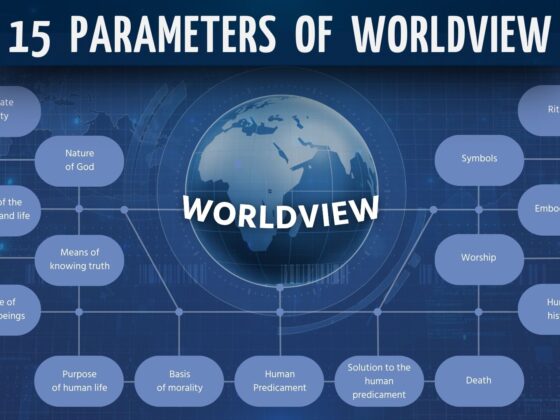How Worship Influences the Heart-Orientation Dimension of Worldview
May 6, 2025
Introduction: Defining Worship as a Parameter of Heart-Orientation
Worship is more than singing songs in church or following religious rituals; it is a profound, heart-oriented expression of devotion to God. At its core, worship is about the orientation of the heart—what we revere, prioritize, and ultimately submit to. In a biblical worldview, worship is not confined to a sanctuary or a Sunday morning gathering. It permeates every aspect of life, shaping how individuals interact with God and the world.
Understanding worship as a parameter of the heart-orientation dimension of worldview allows us to see how deeply it influences spiritual formation. It is essential to recognize that worship is not merely an external activity but an internal disposition that reflects a person’s relationship with God. As Jesus said, “These people honor me with their lips, but their hearts are far from me” (Matthew 15:8). This statement underscores the importance of genuine, heart-driven worship rather than empty religious acts.
Note: This article is part twelve in a 15-part series about the parameters of a worldview. You’ll find links to the other articles at the end of this blog post as they become available. If you haven’t read the previous worldview parameter articles, start with part 1 here: Ultimate reality.
Worship as a Heart-Oriented Dimension of Worldview
Worship as an Inward, Heart-Focused Expression
True worship originates in the heart. Proverbs 4:23 instructs, “Above all else, guard your heart, for everything you do flows from it.” Worship, therefore, is a reflection of the heart’s posture toward God. If the heart is rightly oriented, worship will be sincere, reverent, and transformative.
Paul calls believers to “offer your bodies as a living sacrifice, holy and pleasing to God—this is your true and proper worship” (Romans 12:1). Worship is not limited to rituals; it is a holistic surrender to God, demonstrating the condition of one’s heart through obedience and devotion.
Worship and Worldview Formation
Worship profoundly shapes a student’s worldview by reinforcing biblical truths. Daily engagement in worship—whether through prayer, scripture, service, or gratitude—strengthens a Christ-centered perspective. Colossians 3:16 exhorts believers, “Let the message of Christ dwell among you richly as you teach and admonish one another with all wisdom through psalms, hymns, and songs from the Spirit, singing to God with gratitude in your hearts.”
By integrating worship into daily life, students develop a worldview that acknowledges God’s presence in all things. Hebrews 13:15 reminds us, “Through Jesus, therefore, let us continually offer to God a sacrifice of praise—the fruit of lips that openly profess his name.” Worship is an ongoing practice that aligns the heart with biblical truth and fosters spiritual growth.
Holistic Nature of Worship: Beyond Church and Music
All of Life as Worship
Biblical worship extends beyond church walls. Paul emphasizes this in Colossians 3:23-24: “Whatever you do, work at it with all your heart, as working for the Lord, not for human masters.” This perspective transforms daily activities—work, relationships, and recreation—into acts of worship. Whether studying, working, or interacting with others, believers honor God through their conduct and dedication.
Worship as an Outward Expression of Heart-Orientation
While worship begins internally, it must also manifest outwardly. Jesus teaches, “By their fruit, you will recognize them” (Matthew 7:16). A heart oriented toward God will produce visible acts of love, service, and righteousness. James 2:14-17 warns against faith without action, emphasizing that true worship should be reflected in a believer’s life.
Worship and Spiritual Formation: Impact on Students’ Worldview
Response to Worship and its Effect on Worldview Development
The way students engage in worship reveals their understanding of God and their purpose. John 4:23-24 states, “Yet a time is coming and has now come when the true worshipers will worship the Father in the Spirit and in truth, for they are the kind of worshipers the Father seeks.” Worship influences how students view themselves, their calling, and the world around them, shaping their worldview maturity.
Spiritual Growth through Worship
As students grow in worship, they experience spiritual transformation. And 2 Corinthians 3:18 explains, “And we all, who with unveiled faces contemplate the Lord’s glory, are being transformed into his image with ever-increasing glory.” Worship leads to sanctification, aligning believers more closely with Christ.
Biblical Models of Worship: Old and New Testament Insights
Old Testament Worship Practices
Worship in the Old Testament often involved sacrifices, illustrating the principle that worship requires dedication and reverence. Leviticus 1:1-9 details sacrificial offerings as acts of devotion, while Exodus 12:1-14 recounts the Passover, a formative worship event that shaped Israel’s identity and relationship with God.
New Testament Worship and Living Sacrifices
With Christ’s atoning work, worship transitioned from ritual sacrifices to living sacrifices. Romans 12:1 reiterates this shift, urging believers to offer themselves as living sacrifices, demonstrating ongoing devotion to God. Worship is now relational, focusing on Christ’s redemptive work and daily surrender to Him.
Worldview Perspectives on Worship
Naturalism / Secular Humanism
Secular humanism dismisses worship, emphasizing human autonomy and reason as the highest authorities. In this worldview, truth is determined by human intellect and empirical evidence rather than divine revelation. Worship, as understood in religious traditions, is often seen as an outdated or irrational practice.
Romans 1:21-25 warns of the consequences of rejecting God: “For although they knew God, they neither glorified him as God nor gave thanks to him, but their thinking became futile and their foolish hearts were darkened.”Without a transcendent reference, worship is often replaced by self-exaltation, personal achievement, or material pursuits. People may idolize success, science, technology, or human progress as ultimate sources of meaning.
The absence of worship in secular humanism does not mean an absence of devotion. Instead, worship is redirected toward human potential, self-improvement, or societal advancement. Ethics and morality in this framework are derived from human consensus rather than divine command, leading to a shifting foundation of values.
Pantheism / New Age
Pantheistic and New Age perspectives view worship as an impersonal force rather than devotion to a personal God. In these worldviews, divinity is seen as inherent in all things—humans, nature, the universe itself—blurring the distinction between Creator and creation. Worship becomes a means of self-realization, aligning oneself with universal energy or higher consciousness.
This belief system often leads to practices such as meditation, manifestation, energy healing, and rituals designed to tap into cosmic forces. The goal is not submission to a sovereign God but self-enlightenment and transcendence. Romans 1:25 critiques this mindset: “They exchanged the truth about God for a lie, and worshiped and served created things rather than the Creator.”
By elevating nature, personal intuition, or mystical experiences above divine revelation, pantheism distorts worship into a self-focused journey rather than a relationship with the living God. While it acknowledges a spiritual dimension, it ultimately lacks the redemptive truth found in biblical worship.
Theism / Biblical Christianity
In contrast, biblical Christianity teaches that worship is a response to the personal, sovereign God who reveals Himself through His Word. Worship is not about seeking inner divinity or human achievement but about recognizing God’s holiness, love, and authority.
Jesus declares in John 4:23-24: “Yet a time is coming and has now come when the true worshipers will worship the Father in the Spirit and in truth, for they are the kind of worshipers the Father seeks. God is spirit, and his worshipers must worship in the Spirit and in truth.”
Biblical worship is centered on:
- Reverence for God’s character – Worship acknowledges God’s supreme authority and righteousness.
- Gratitude for salvation – Worship is a response to God’s grace through Jesus Christ, recognizing His redemptive work.
- Obedience and surrender – True worship extends beyond words and rituals; it is reflected in a life devoted to God.
Unlike secular humanism, which exalts human autonomy, or pantheism, which dissolves the distinction between God and creation, biblical worship affirms God’s transcendence and immanence. It is relational rather than ritualistic, rooted in faith rather than personal enlightenment. Worship shapes a believer’s entire life, influencing thoughts, decisions, and actions to align with God’s will.
Connection Between Worship and Worldview Maturity
Worship as a Gauge of Worldview Development
Worship reflects the depth of a student’s biblical worldview. Romans 12:2 states, “Do not conform to the pattern of this world, but be transformed by the renewing of your mind.” A student’s approach to worship reveals their alignment with God’s truth and their commitment to living it out.
Role of Worship in Developing a Robust Biblical Worldview
Regular, heartfelt worship reinforces a biblical framework, shaping how students interpret and engage with the world. Colossians 3:16 emphasizes the role of worship in spiritual growth, urging believers to let Christ’s message dwell in them richly.
Now What?
To deepen your understanding of how worship shapes worldview, download our free resource, “10 Questions to Understand Worldview.” This guide will help you assess students’ engagement with worship and its impact on their spiritual growth. Additionally, the 3-Dimensional Worldview Survey offers insights into how worship influences worldview development in your school or organization.
Worship is not just a religious duty; it is a transformative practice that shapes our hearts, minds, and worldview. By cultivating a lifestyle of worship, students can develop a strong biblical foundation, fostering spiritual maturity and a Christ-centered perspective on life.
What Is the 3-D Worldview Survey?
- Take the 3-D Worldview for yourself
If you haven’t yet used the 3DWS with your class, check out the pdf 10 Questions to Understand Worldview linked below to get started.
#worshipandworldview #studentdiscipleship #3dworldview
Key Takeaways
- Worship Shapes Heart-Oriented Beliefs: The article emphasizes how worship practices are integral in shaping a person’s heart-orientation, which encompasses deeper emotional responses and personal convictions. This dimension of worldview influences how individuals relate to God, others, and the world around them.
- The Role of Worship in Spiritual Formation: Worship is not just an act of praise; it plays a vital role in spiritual formation by aligning one’s affections, attitudes, and motivations with biblical teachings. The article suggests that consistent worship cultivates a heart-oriented disposition toward God’s truth and love, affecting daily behavior and decisions.
- Impact on Worldview Integration: Worship integrates emotional, cognitive, and volitional elements of a person’s worldview. Through worship, individuals are invited to reflect on God’s sovereignty and purpose, which in turn reshapes their internal compass, guiding how they interact with the world and engage with others in faith-based communities.





